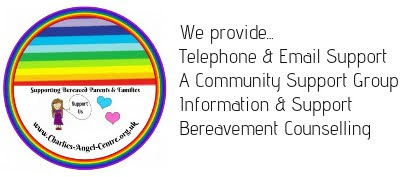She spoke of how surprised and shocked she was that there were very few groups out there specifically for baby and child loss bereavement support. She said that she felt unprepared to be faced with a family that was having to deliver a stillborn child or a child that was likely to pass through illness shortly after birth.
We are always happy to welcome anyone to come along to meet us and we felt that this could be a really good chance to let the future of midwifery know about what is and isn't out there for families.
Since we began the charity we have always said that we want to work with the NHS and any other agency that works with or comes into contact with parents and families that have experienced the loss of a baby or child. We have never wanted to antagonise these people or, as many of them think, 'have a go'. The only way to make improvements and identify areas for improvement is for everyone to work together. Unfortunately we have at times found resistance to meet with us.
This week the midwife came along to one of our Community Support meetings.
She explained that during their training there is no specific training given on bereavement and the support needed around it. It is expected that if the students wanted to learn more about it they were to do so off their own backs and in their own time.
This to us is absolutely ludicrous.
How can staff be expected to support families through a loss when they have not even been given basic training around bereavement.
So many families we come into contact with say how they felt that the nurses and midwives didn't know how or what to say and do around them and they often felt that they looked very awkward and uncomfortable.
Grief is a very complex state and can show itself in many ways. It can lead onto other illnesses and will show as physical conditions. If the staff are not trained to identify these signs and symptoms how are the families expected to receive an adequate standard of care. It is not even the nurses fault, as I am sure many of them if not all would be happy to undergo extra training.
Even just typing that makes me feel angry and so worried for the families that are still being let down by the system that is supposed to be there to help them.
Bereavement support after the loss of a baby or child has been given a lot more air space on TV and radio lately and many trusts have already started reviews of the midwifery services in their area/trust. However when you look further into it the area of bereavement midwifery services only usually takes up a very small section of the review. It seems to still be an area that still does not get the acknowledgement it deserves and needs.
The midwife who visited us seems very keen to improve her knowledge and was enthusiastic about trying to do some voluntary hours with hospital staff who work within the bereavement teams. I know this is just one nurse, but 1 is a start and hopefully she will go back and tell her colleagues and tutors about us and the others that are out there supporting those families.
It was also good to be able to share ideas about how simple changes to the systems used both in hospital and in the community could make such a big difference.
One hospital she had experienced had used a 'Teardrop' sticker on a ladies notes which showed that she had previously lost a baby.
We have always said that there needs to be a way that Dr's, GP's, Midwives and Health Visitors could all communicate effectively to ensure that this information was known by all involved with the family. Such a simple but effective method but one that could really make an impact. If only we could get a standardised pathway across the country that all followed the same way of notifying and recording all important and relevant information.
We know it won't be easy and we know it won't happen quickly but we are ready and willing to keep up our campaign to make these changes happen.
One thing is for sure Charlies-Angel-Centre Foundation will never give up and we will continue to campaign until there are enough bereavement midwives for each NHS trust, there are safeguards in place to ensure that no family falls through the net and gets inadequate support and that communication between all disciplines is effective and proactive.
Initially the charities aim was for Leeds to have the best bereavement support following the loss of a baby or child in the country but now we want all of the UK to have a bereavement service that would ensure that no family has to go through loss alone and that they all received adequate and timely support through whichever services were needed.
Meeting the student midwife gave me a little bit of hope that the future of bereavement support within midwifery services could be ready to improve. If she can realise that there needs to be a better system of support then there must be many more out there that are also starting to see that changes need to happen.

No comments:
Post a Comment